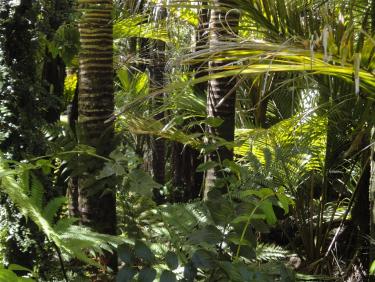
Collegio Futuro
Interdisciplinary college for sustainable development
Collegio futuro is a joint educational project of the 4EU+ member universities. Participants tackle environmental issues in an interdisciplinary manner and practice science communication to policymakers and civil society. The training is open to doctoral candidates, and advanced Master’s degree students from different disciplines: natural & life sciences, social sciences & economics, or cultural sciences.
COLLEGIO FUTURO EDITION 2026
Fighting climate change, biodiversity loss, and environmental pollution: Conflicts and Synergies of Different Land Use Options
Preparatory online sessions: January 2026
Winter School on campus: 2 – 6 February 2026, Heidelberg
-
broaden knowledge beyond your own research area
-
improve your science communication skills
-
generate momentum for new projects
- expand your network
-
generate momentum for new projects
-
improve your science communication skills

VISION
Tackling global challenges like climate change or biodiversity loss and advancing the United Nations' Sustainable Development Goals calls for more than just technical fixes—they require a fundamental socio-economic transformation. Such a transformation must be inclusive, engaging a wide range of societal stakeholders and drawing from diverse fields of knowledge. True progress depends on collaboration across disciplines and the courage to explore new approaches.
Collegio futuro has been designed with this vision in mind. By developing policy briefs, exchanging ideas, and engaging in dialogue with both scientists and practitioners, participants explore the complexities of sustainability from multiple angles and develop an open-minded, cross-sector collaboration that is essential for building a more sustainable future.

Journal
Policy brief
EVERY ECOSYSTEM NEEDS SOME DISTURBANCE REGIME
Disturbances like wildfires, floods, avalanches, and pest outbreaks are commonly viewed as disruptive forces, but in reality, they are vital to maintaining healthy ecosystems. These events promote biodiversity, facilitate nutrient cycling, and enhance ecosystem resilience ...

Policy brief
TOWARDS A SUSTAINABLE EU AQUACULTURE
Aquaculture is the most scalable method of fish production, and a pescetarian diet is the most climate-friendly option with animal protein. However, monoculture harms ecosystems through feed waste, increasing fish mortality. Integrated multi-trophic aquaculture (IMTA) offers a more sustainable, multi-species approach, producing more protein with fewer environmental impacts. This policy brief recommends promoting IMTA in Europe by simplifying regulations, offering economic incentives, and supporting knowledge transfer.

Policy brief
ADAPTATION OF PROTECTED HISTORIC CITIES TO HEAT
Historic cities like Heidelberg face climate challenges from the Urban Heat Island effect and heat waves, which endanger health, productivity, and heritage. Targeted, non-invasive strategies could boost resilience while preserving historic character.

EDUCATIONAL PROGRAM ARCHIVE
Collegio futuro was launched in 2021 within the 4EU+Alliance Flagship 4 “Environmental Transitions.” In three editions up to 2025, this educational project has brought together 10 researchers and 77 doctoral students to discuss pressing environmental issues. Collegio futuro editions have evolved, in collaboration with participants, into blended activities, including a one-week winter or spring school on campus, preceded by short preparatory online sessions.

SPIN-OFF PROJECTS
Climate Action Science
European member states possess significant potential to reduce emissions and mitigate the climate change, making their actions—or lack thereof—a powerful signal to the rest of the world. However, national climate policies within the EU often do not match the ambitious goals of the European Commission. The Collegio futuro group Climate Action Science continued to cooperate beyond the course to explore the questions: How are climate impacts evolving over time in different European countries? What shifts are occurring in public attitudes and climate policies? And how are these elements interconnected? The results have been published in the journal „Sustainability“ in 2023.
Post-mining sites: the green gold rush
Born from interdisciplinary collaboration on ecosystem restoration, the project examines the potential of marginal land, such as former coal mining sites across Europe, to be transformed into areas of environmental sustainability and economic opportunity. The project has been selected for funding within the 4EU+Call „Charles Minigrants for students 2024“ awarded by Charles University.





